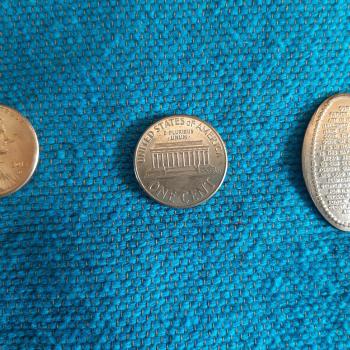
My grandfather wound up in the hospital in his last days, and his pastor came to see him. We happened to also be visiting, and at the bedside the pastor offered a prayer. His prayer was warm and simple and short, but what caught my attention was the language. While the pastor spoke standard, Midwestern, ă-is-for-apple-pie English, he prayeth in the dialect of old King James, thys and thous rising to heaven as antique incense. Maybe he picked up his Authorized Version aesthetic in seminary. Maybe it was the lilt of memorized prayers. Or maybe this pastor only knew he was praying when his prayers sounded like something from of old.
Just how do we know when we’re praying? Sure, if it’s an ask lofted toward heaven, that’s a prayer. Maybe any word directed Godward, even in the vaguest sense, is a prayer. But what about practicing the presence of God, being attentive to God in the moment? How do we know when we’ve crossed the threshold into prayer? Is there even a threshold? Am I praying if I’m just sitting quietly? Maybe I have to open a hailing frequency.
“I don’t know exactly what a prayer is,” writes Mary Oliver in her poem “The Summer Day.” “I do know how to pay attention.” I’ve been there, alone with my soul and my God, equipped with the gospel, legs folded up and head bowed. Sometimes, I catch myself praying like my grandfather’s pastor: not so much in King James English, but with little taglines meant to signal (to God? To myself?) that now, I am indeed praying. O God, I pray to you.
In contrast to antiquated words or taglines, when the apostle Paul called the Colossians to devote themselves to prayer, he instructed them that they would need to keep alert, with thanksgiving. Alertness and gratitude are the key. Verbal filigree is not required.
To keep alert means staying awake or waking up (Mark 14:38; Revelation 3:2). In this way, prayer is a character of attention: attention to God, but also attention to what’s streaming across our hearts. Not everything we discover inside ourselves is worthy of sustained reflection. But at the very least, we need to know what’s growling around down there under the stairs. Sometimes, we can pick up on areas where sin is hindering us, keeping us from imagining with gentle grace what God desires and promises.
To give thanks is to approach God with a basic and grateful recognition of the giftedness of all of life. This should be straightforward, but because most of us are closet narcissists who secretly believe that we deserve a little more and a little better, it’s easier said than done.
Prayer is paying attention and practicing gratitude. It’s less about the words we say than the stance we take toward God. If we are attentive to God, oriented toward him in gratitude, then we are already praying. To do these things is to begin to “pray without ceasing” (1 Thessalonians 5:17).
Sometimes, I find that my prayers consist of simply saying the name of Jesus. So much is wrapped up in that name, the one name under heaven whereby we must be saved, the name on which we call for rescue, the name above all names to which every knee in heaven and on earth and under the earth shall bow (Acts 4:12; Romans 10:7; Philippians 2:5-11). In the book of Acts we see the disciples baptizing on the authority of Jesus’ name and healing in Jesus’ name and casting out demons in Jesus’ name (Acts 2:38; 3:6; 16:18). In 3 John, that little letter, John speaks of missionaries as those who were sent out “for the sake of the Name” (v.7 NIV). The name of Jesus is precious to us as his followers. It contains the whole of the gospel (Jesus = Yahweh saves). And it contains the whole of prayer. I’m convinced that if we do nothing more than say Jesus’ name in reverence and love, we are already with that simple act praying truly. Jesus said, “The Father will give you whatever you ask him in my name” (John 15:16).
What we’re ultimately seeking is Christ’s presence with us. But we’re also seeking to make ourselves present and available to Christ. “Dwell unceasingly with the Name of the Lord Jesus,” teach the ancient Orthodox spiritual writers, “so that your heart may absorb the Lord, and the Lord absorb your heart, and the two be one.” (The Art of Prayer: An Orthodox Anthology, 102).
Prayer is going heart to heart with Jesus. That’s it.












